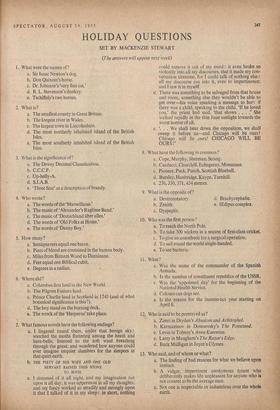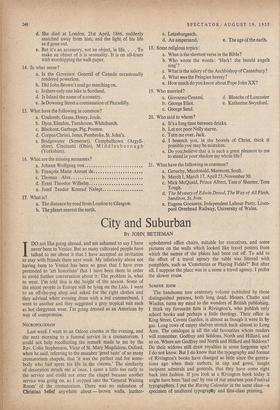HOLIDAY QUESTIONS
1. What were the names of?
a. Sir Isaac Newton's dog.
b. Don Quixote's horse.
c. Dr. Johnson's 'very fine cat.'
d. R. L. Stevenson's donkey.
e. Tschiffely's two horses.
1, What is?
a. The smallest county in Great Britain. h. The longest river in Wales.
c. The largest town in Lincolnshire.
d. The most northerly inhabited island of the British Isles.
e. The most southerly inhabited island of the British Isles.
3. What is the significance of?
a. The Dewey Decimal Classification.
b. C.C.C.P.
c. Up-helly-A.
e. 'Three Star' as a description of brandy.
4. Who wrote?
a. The words of the `Marseillaise.'
b. The music of 'Alexander's Ragtime Band.'
c. The music of 'Deutschland Ober alles.'
d. The words of 'Old Folks at Home.'
e. The words of 'Danny Boy.'
5. How many?
a. Semiquavers equal one breve.
b. Pints of blood are contained in the human body.
c. Miles from Birnam Wood to Dunsinane.
d. Feet equal one Biblical cubit.
e. Degrees in a radian.
6. Where did?
a. Columbus first land in the New World.
b. The Pilgrim Fathers laud.
c. Prince Charlie land in Scotland in 1745 (and of what botanical significance is this?).
d. The boy stand on the burning deck.
e. The wreck of the 'Hesperus' take place.
7. What famous novels have the following endings?
a. I lingered round them, under that benign sky : watched the moths fluttering among the heath and hare-bells; listened to the soft wind breathing through the grass; and wondered how anyone could ever imagine unquiet slumbers for the sleepers in that quiet earth.
b. THE PIETY OF HIS WIFE AND ONE OLD SERVANT RAISED THIS STONE TO BOTH.
C. 1 dreamed of it all night. and my imagination ran upon it all day; it was uppermost in all my thoughts; and my fancy worked so steadily and strongly upon it that I talked of it in my sleep: in short, nothing could remove it out of my mind : it even broke so violently into all my discourses, that it made my con- versation tiresome, for I could talk of nothing else: all my discourse ran into it, even to impertinence; and I saw it in myself.
d. There was something to be salvaged from that house and room, something else they wouldn't be able to get over—his voice speaking a message to her': if there was a child, speaking to the child. 'if he loved you,' the priest had said, 'that shows . . . .' She walked rapidly in the thin June sunlight towards the worst horror of all.
e. `. . . We shall bear down the opposition, we shall sweep it before us—and Chicago will be ours! Chicago will be ours! CHICAGO WILL BE OURS!'
8. What have the following in common?
a. Cope, Murphy, Sherman. Strang.
b. Carducci, Churchill, Echegaray. Mommsen.
c. Pioneer, Puck, Punch, Scottish Bluebell.
d. Bursley, Hanbridge, Knype, Turnhill.
e. 276, 330, 371, 434 metres.
9. What is the opposite of?
a. Dextrorotatory. h. Zenith.
c. Dyspeptic.
10. Who was the first person?
a. To reach the North Pole.
b. To take 300 wickets in a season of first-class cricket.
c. To give an anaesthetic for a surgical operation.
d. To sail round the world single-handed.
e. To see bacteria.
11. What?
a. Was the name of the commander of the Spanish Armada.
h. Is the number of constituent republics of the USSR.
c. Was the 'appointed day' for the beginning of the National Health Service.
d. Colours can dogs see.
e. Is the reason for the income-tax year starting on April 6.
Who is said to be portrayed as?
a. Zimri in Dryden's Absalom and Achitophel.
b. Karmazinov in Dostoevsky's The Possessed.
c. Levin in Tolstoy's Anna Karenina.
e. Larry in Maugham's The Razor's Edge.
d. Buck Mulligan in Joyce's Ulysses. 13. Who said, and of whom or what?
a. The finding of bad reasons for what we believe upon instinct.
b. A vulgar, impertinent anonymous tyrant who deliberately makes life unpleasant for anyone who is not content to be the average man.
c. Not one is respectable or industrious over the whole earth. P. d. Brachycephalic.
e. (Edipus complex. d. She died at London, 21st April, 1866, suddenly snatched away from him, and the light of his life as if gone out.
e. But it's an accessory, not an object, in life. . . . To make an object of it is sensuality. It is on all-fours with worshipping the wall-paper.
14. In what sense?
a. Is the Governor General of Canada occasionally rendered powerless.
b. Did John Brown's soul go marching on.
c. Is there only one lake in Scotland.
d. Is Island the name of a country.
e. Is Downing Street a continuation of Piccadilly.
15. What have the following in common?
a. Coulomb, Gauss, Henry, Joule.
b. Dyce, Elmdon, Turnhouse, Whitchurch.
c. Blackout, Garbage, Pig, Pounce.
d. Corpus Christi, Jesus, Pembroke, St. John's.
e. Bridgewater (Somerset). Ca mpbelltown (Argyll- shire), Cincinatti (Ohio), Middlesborough (Yorkshire).
16. What are the missing surnames?
a. Johann Wolfgang von b. Francois Marie Arouet de c. Thomas Alva d. Ernst Theodor Wilhelm e. Josef Teodor Konrad Nalegz 17. What is?
a. The distance by road from London to Glasgow.
b. The planet nearest the earth. c. Letzeburgesch.
d. An ampersand. e. The age of the earth.
18. Some religious topics : a. What is the shortest verse in the Bible?
b. Who wrote the words : `Hark! the herald angels sing'?
c. What is the salary of the Archbishop of Canterbury?
d. What was the Pelagian heresy?
e. How much do you know about Pope John XX?
19. Who married?
a. Giovann a Cenami. d. Blanche of Lancaster b. George Eliot. e. Katharine Swynford.
c. George Sand.
20. Who said to whom?
a. It's a long time between drinks.
b. Let not poor Nelly starve.
c. Turn me over, Jack.
d. I beseech you, in the bowels of Christ, think it possible you may be mistaken.
e. Do you,believe that it is such a great pleasure to me to stand in your shadow my whole life?
21. What have the following in common?
a. Grouchy, Macdonald, Marmont, Soult.
b. March 1, March 17, April 23, November 30.
c. Mick McQuaid, Prince Albert, Tam o' Shanter, Tom Tough.
d. The Mystery of Edwin Drood, The Way of All Flesh, Sanditon, St. Ives.
e. Eugene Goossens, Independent Labour Party, Liver- pool Overhead Railway, University of Wales.



































 Previous page
Previous page